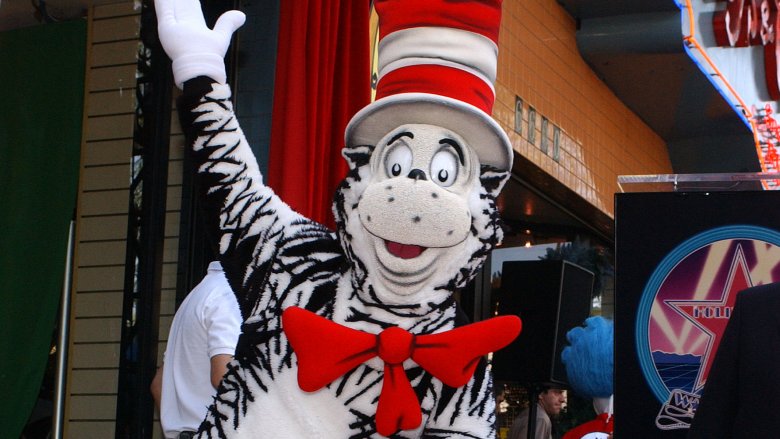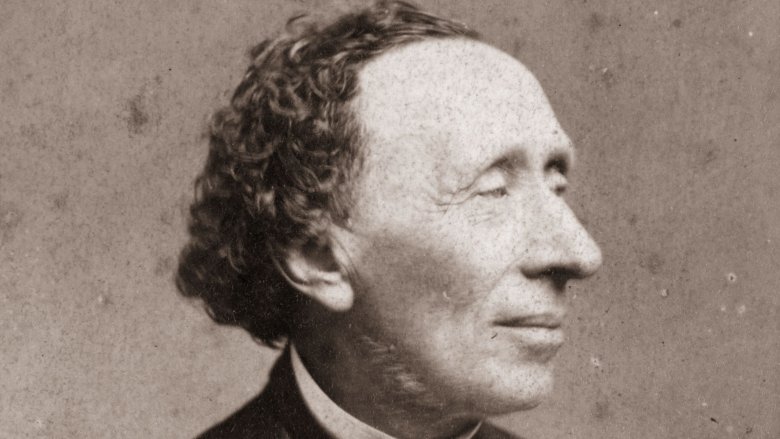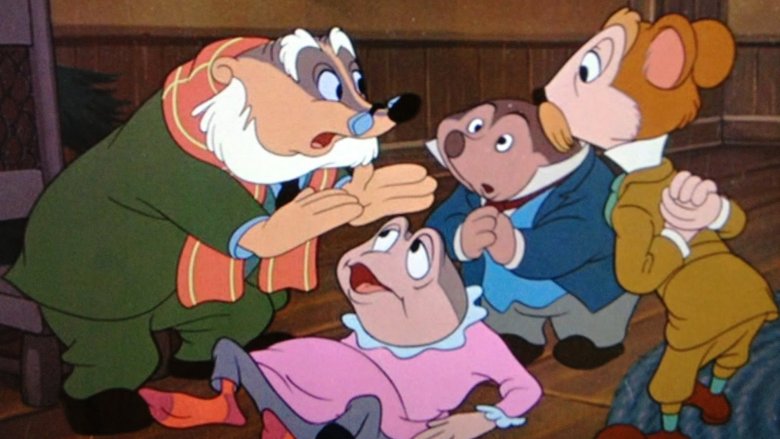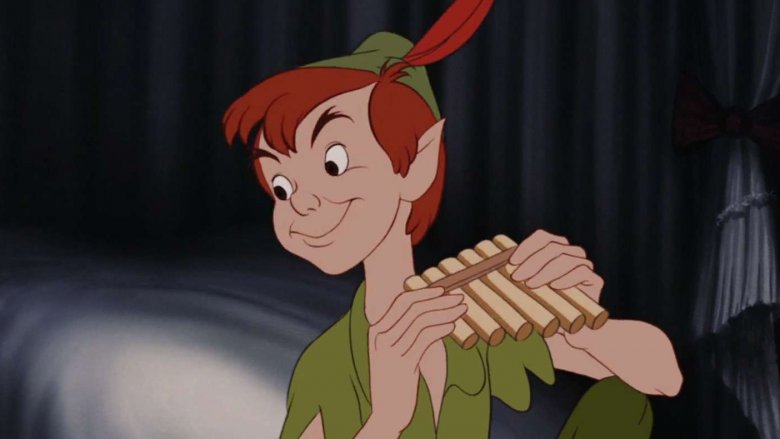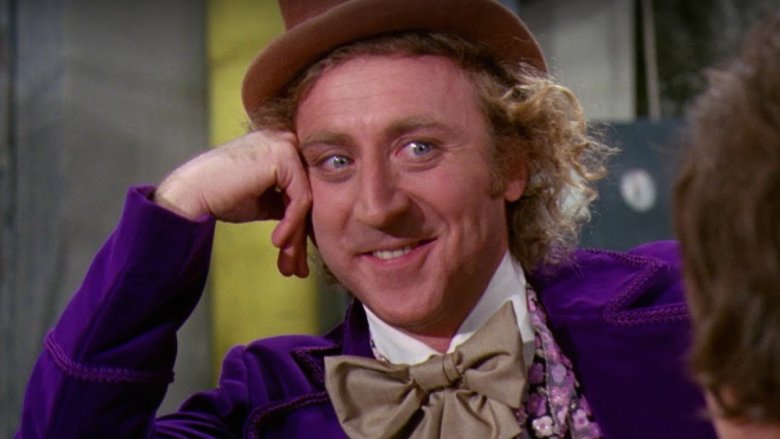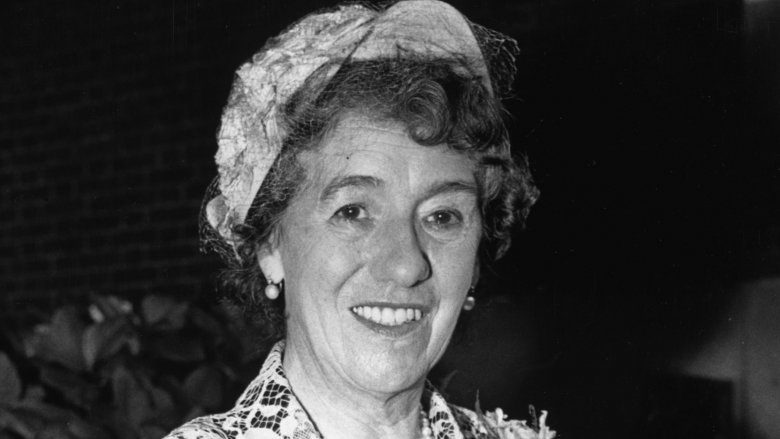The Dark Side Of Your Favorite Children's Authors
There's nothing like re-reading a great children's book to evoke warm feelings of nostalgia. The memories of those innocent times, when the world was good and life was simple, all wrapped up in evocative names: Peter Pan, Toad of Toad Hall, the Little Mermaid, Noddy. What better way to escape a tainted world than by immersing yourself in the wholesome tales of such carefree characters?
Boy, did you ever click on the wrong article. As part of our ongoing mission to ruin childhood for everyone, we're here to tell you that those characters aren't nearly as innocent as they appear. Rather, they were written by a true rogues' gallery of drunks, misogynists, emotional basket cases, sexual deviants, bullies and mad anti-Semites. Still think the authors of your childhood favorites were paragons of virtue? Wait until you read about the following nut jobs.
Doctor Seuss cheated on his dying wife
Theodor Geisel is the man who made your childhood awesome. Under the pseudonym Doctor Seuss, Geisel wrote books so weird, so multilayered, and so brilliant that people still debate what they're really about. Is the Butter Battle Book a knockabout rhyme, or a horrifying allegory of the Cold War? What about the argument that Horton Hears a Who is really a veiled commentary on the American occupation of Japan? These are dark, complex books impressively disguised as innocent kids' fare.
Know what else that description could apply to? Dr. Seuss himself. Most of you probably subscribe to the image of the author as an avuncular, whimsical man with a small naughty streak. But far from being a lovable, mischievous Cat in the Hat-figure, a Broadly article explains that the real Theodor Geisel was a philanderer who cheated on his wife Helen as she lay partially-paralyzed and dying of cancer.
That's right, the guy who brought the world Fox in Socks and There's a Wocket in My Pocket was also the guy who brought his family Seuss the Cheating Moose. While Helen was bedridden with terminal cancer, Geisel shacked up with Audrey Diamond, who was half his age and married with two kids. Know how Helen took the news? She committed suicide. The New York Times reports that less than a year later, Audrey became Mrs. Geisel mk. II, and sent her already-traumatized children away to live with relatives, simply because Geisel hated being around kids. Who knew the Grinch was meant to be a damning self-portrait?
The Author of "Little Tree" was a neo-Nazi terrorist
Anyone who grew up in a New Age household will remember the Education of Little Tree. Forrest Carter's memoir of his Cherokee grandparents and a childhood far from the hypocrisy of modern society was a smash hit. Although later revealed to be fiction, its environmental themes, spiritual wisdom, and Yong Adult-friendly adventures ensured its lasting popularity.
But it wasn't just the story of Little Tree that turned out to be made up. In 1991, the New York Times revealed Forrest Carter was as fake as his book. The real author was a white supremacist once linked to the Ku Klux Klan.
"Forrest" was really Asa Earl Carter, a guy who ranked at about an 11.5 on the George Wallace 10-point scale of racial animosity. In fact, Carter had previously written speeches for Wallace, the onetime governor of Alabama, including his infamous "Segregation now, segregation forever" rant. In his downtime, Carter organized the paramilitary wing of his local KKK chapter. While he was leader, members abducted a black handyman named Edward Aaron and, as Salon recounts, castrated him. It's unknown if Carter himself was involved, but when your friends are racist, knife-wielding terrorists, it's probably safe to judge you by the company you keep.
At some point, Carter cut ties with racists, moved from Alabama to Texas, changed his name to Forrest and started telling people he was an official storyteller of the Cherokee nation. His act was so convincing to other white people that he wound up getting a book deal.
Hans Christian Andersen kept a masturbation diary
In the pantheon of distressing thoughts, there's none quite so distressing as that of the author of the Little Mermaid playing with his junk as he created immortal children's literature. Yet that's exactly what Hans Christian Andersen liked to do. His diary is full of barf-inducing descriptions of of his endless experiments in hand-based self-pleasure.
For Andersen, there was seemingly no greater joy than talking to an attractive person then immediately running off to have a magnificent wank. The Life of a Storyteller, Jackie Wullschlager's biography of Andersen, details (via The Guardian) how, when in Paris, the children's author would pay prostitutes to talk to him, then go scuttling home for some solo nighttime fun. When good-looking friends came round for a social visit, Andersen would sneak upstairs to relieve himself of his tension. And you better believed he liked to record each bout of self-love for posterity. His diaries have a system where a particularly good pant-rummage is marked with a "++" in the margins.
There's also the interesting matter of just who Andersen was attracted to. While he certainly liked to play with himself after meeting women, there's evidence he was equally-attracted to young men, not least the passionate love letters he wrote to boys much younger than he was. Not that his rampaging sexual appetite seems to have disturbed the writer. The diary entries are written about in jolly, sunny detail and brimming with perverted optimism.
William Mayne was a child abuser
If you're unaware of William Mayne, you should know he was a big deal in Britain. The author of over 130 children's books, from Lady Muck to the Earthfasts/Candlefasts trilogy, Mayne's work was raved about by critics, picking up awards from the Guardian Children's Fiction Prize to the ultra-prestigious Carnegie medal. Philip Pullman admired him. All of which made the 2004 revelations about his personality so simultaneously bleak and icky. The whole half-century of his career, Mayne had been using his fame to abuse children, as detailed in The Guardian.
Mayne had always been openly uncomfortable around adults, preferring instead to help out at local elementary schools. He kept an open house for kids, and would take them out driving in his classic cars. This being the innocent past, nobody thought there was anything untoward about a dude who can't interact with adults turning his home into the British equivalent of the Neverland Ranch, even though he'd already been accused of sexual assault in 1973. True, it was a different time, but still, there's stuff that's not cool no matter what time period you're living in.
"Not cool" would be the politest way of describing the actions that led to Mayne's downfall. The author was finally jailed for forcing himself on pre-pubescent girls then telling them "it is only what girls want." Thankfully, this admittedly-talented creep was found out while still alive and died in disgrace.
Kenneth Grahame's family life was truly creepy
Seen in only broad brushstrokes, the life of Kenneth Grahame, author of The Wind in the Willows, was dishwater dull. He worked in a bank, married late, never had affairs, and spent his spare time going on walks. But look beyond the outlines, and the picture that emerges is like one painted by a drunk Pablo Picasso. The relationships binding Grahame, his wife Elspeth, and their son "Mouse" were all truly creepy, as explained in Alison Prince's 1994 biography An Innocent in the Wild Wood (via The Telegraph).
His relationship with Elspeth was bizarre from the get-go. According to Prince, the two locked themselves into a competition to see who could be more childlike, acting immature and seducing one another with baby talk. It was also based on freakishly odd acts of manipulation. Elspeth forced her husband to only change his underpants once a year, when they were so well and truly soiled you could probably plant turnips in them. But none of this has anything on their relationship with their son.
Born Alastair, the boy was known to his parents by his nickname "Mouse". However, Mouse had another nickname he preferred: Robinson, the name of the assassin who had shot and nearly killed his father. Elspeth and Grahame spoiled him rotten, telling him he was a genius (spoiler: he wasn't), and letting him get away with horrendous behavior. All this misplaced doting wound up putting Mouse under insane pressure, and he committed suicide aged just 19 by lying down in front a train. Grahame and Elspeth reacted by sinking into a mutual loathing that lasted the rest of their lives.
J.M. Barrie falsified his best friend's will to become guardian of her children
Outwardly, J.M. Barrie was Victorian kindness personified. The author of Peter Pan famously loved children. He left the copyright of his most-famous work to Great Ormond Street children's hospital, raising millions for the institution. But beneath this generous veneer, there was the personality of Captain Hook, just waiting to get out, almost literally. Barrie's most-awful deed, recounted in this article from The Guardian, was falsifying the will of his best friend, Sylvia, to allow him to steal her children.
Barrie had met Sylvia through Gerald and Muriel du Maurier, parents of novelist Daphne "the Birds" du Maurier. Sylvia was Gerald's sister, and mother of five children who would find literary immortality as Peter Pan's "Lost Boys." Barrie fell head over heels for both the mother and kids, ingratiating himself into their family as either — depending on who you believe — a sort of kindly uncle, or the Victorian equivalent of the Talented Mr. Ripley. He more or less lived with them until Sylvia died. Then things got truly weird.
Sylvia left a handwritten will asking for her children to be left with Jenny, the sister of the boys' beloved nanny. Barrie found the will and altered "Jenny" to "Jimmy", implying himself. Incredibly, he got away with it. The "lost boys" became his adopted children, "spirited away" as one of them later wrote, "from (their) mother's and father's friends." It was a grim strategy with even grimmer consequences. Of the five children adopted by Barrie, two would later commit suicide, and one would suffer a catastrophic nervous breakdown.
Roald Dahl was a bully who compared Israel to Nazi Germany
Roald Dahl — author of Charlie and the Chocolate Factory, Matilda, James and the Giant Peach, and plenty more – is probably the only children's writer on this list who has never been thought of as "innocent." The former British spy was a serial philanderer who seduced half of American high society and wrote adult novels on the side about stuff like men turning into gigantic penises. But it's one thing to discover a beloved children's author has a secret raunchy side. It's another entirely to discover he was an abusive bully who compared Israel to Nazi Germany. It's all detailed in the Donald Sturrock biography Storyteller (via The Independent).
First: the bullying. Dahl was a prize, grade A fart-hole. He used to criticize his family during meal times, and had affairs under his wife's nose, even when she was recovering from a near-fatal stroke (what we're gonna henceforth call "pulling a Seuss"). He treated his colleagues with disdain. When his name wasn't big enough on the cover of his book The Twits, he wrote abusive, expletive-laden rants to his publisher. Things got so bad Random House threatened to drop the highly-lucrative author unless he began acting civilly.
Then there are the comments he made about Israel during the 1982 invasion of Lebanon. Dahl claimed the world now hated Israel, compared the Jewish state to Nazi Germany and rhetorically asked if the answer was to invade Israel. His justification for his outburst was a magnificent piece of hole-digging. Dahl wrote there was "a trait in the Jewish character that does provoke a certain animosity..." before concluding, "even a stinker like Hitler didn't just pick on them for no reason."
Enid Blyton had the foulest temper
Enid Blyton's novels are so mind-meltingly inoffensive it's hard to believe she even had a personality, let alone an awful one. Her plots involve nothing more controversial than kids drinking lashings of ginger beer while talking in the sort of "hey-ho, lads!" way that even the biggest puritan couldn't take offense to. This may be because Blyton saved all her offensiveness and controversy for her actual life. Far from being gentle and bland, the creator of Noddy and the Famous Five was a foul-tempered rage machine with a passionate interest in nudism, as explained by writer John Walsh in The Independent.
According to her own daughter Imogen, Blyton was childish, spiteful, arrogant, insecure and pretentious. She played favorites with her two kids, over-privileging one until they both developed massive insecurities of their own. When she divorced her husband Hugh, she turned their children into a weapon. After Hugh remarried, she forbade the kids from ever seeing him again, even though they begged her. The truly hypocritical part? Blyton herself had already remarried.
Her cruelty came out in her work, too. Her clueless policeman character, PC Theophilus Goon, was a nasty caricature of Hugh, who she'd spent years of their marriage cheating on without him ever realizing. Her relationship with her parents was similarly bitter and miserable. She let colleagues think her mother was dead for years, until, at last, she finally was. Less dark, but still bizarre, were her sexual obsession with her children's nanny, Dorothy Richards, and her insistence on playing tennis completely naked.
Alison Uttley was a domineering basketcase who drove her son to suicide
The one time the creator of Little Grey Rabbit, Alison Uttley, met Enid Blyton, she hated her. It may be because she recognized a kindred spirit. While Blyton was an insecure, spiteful bully, Uttley was a basketcase of seething paranoia, endless loathing, and an envy that burned so bright you could melt steel with it. An Independent article, relying heavily on Uttley's own journals, tells the tale.
For one thing, she hated other successful women. While successful men were charming or intelligent, successful women were "humorless bores," "vulgar," and untalented. Part of this may have been due to her insane need to keep proving she was better than others. Whenever Peter Rabbit creator Beatrix Potter was mentioned, Uttley would declare Potter was a mere illustrator, while she herself was a great "spinner of tales." Despite living near Enid Blyton, she went out of her way to avoid her (possibly with good reason, given what we've learned about Mrs. Blyton just a few paragraphs ago). No matter how famous she got, she was never content.
Her home life was pretty messy, too. Her biographer, Professor Denis Judd, claimed she was a domineering control-freak, and when it came to her only son, John, she couldn't simply let him be. The two developed such an unhealthily close relationship that after Uttley died in 1976 John committed suicide by driving his car off a cliff. It seems life with a mother like Uttley had left him completely ill-equipped to deal with a world without her. Who'd want to have a children's author as a parent, huh?

